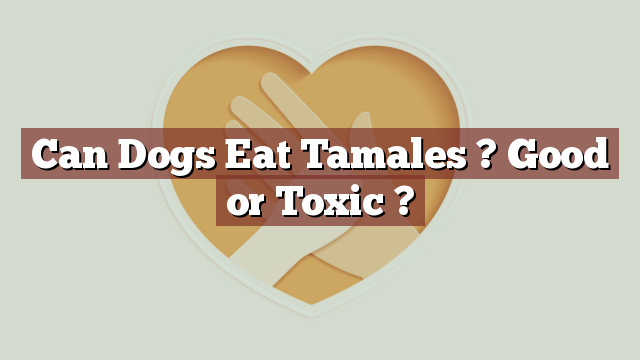Can Dogs Eat Tamales? Good or Toxic?
As responsible pet owners, it is crucial to be aware of the foods that are safe for our furry friends to consume. While we may enjoy indulging in various dishes, it is important to consider whether they are suitable for our dogs’ dietary needs. In this article, we will explore the topic of whether dogs can eat tamales and discuss the potential risks and benefits associated with this popular Mexican dish.
Nutritional Value of Tamales: What Do They Contain?
Tamales are a traditional Mexican dish made from masa (a type of corn flour), which is mixed with water or broth and lard. This mixture is then spread onto a corn husk and filled with various ingredients such as meat, cheese, or vegetables. Tamales are then steamed until cooked.
In terms of nutritional value, tamales can vary depending on the filling and preparation method. However, they generally contain carbohydrates from the masa, protein from the meat or cheese, and fats from the lard. Tamales may also contain fiber, vitamins, and minerals depending on the ingredients used.
Can Dogs Eat Tamales? Is it Safe or Toxic for Them?
No, dogs should not eat tamales. While the ingredients individually may not be toxic to dogs, the combination of ingredients, especially the spices and seasonings used, can be harmful to their digestive system. Tamales often contain onions, garlic, and other spices that are known to be toxic to dogs. Additionally, the high fat content in tamales can lead to digestive issues such as pancreatitis in dogs.
It is important to note that dogs have different digestive systems and nutritional needs than humans. What may be safe and enjoyable for us can be potentially harmful to them. Therefore, it is best to avoid feeding tamales to your furry companion.
Potential Risks and Benefits of Dogs Consuming Tamales
Feeding tamales to dogs can pose several risks. The spices and seasonings used in tamales can cause gastrointestinal upset, including vomiting, diarrhea, and even organ damage in severe cases. The high fat content can lead to obesity and pancreatitis, a painful condition that affects the pancreas.
On the other hand, there are no specific benefits for dogs to consume tamales. Dogs have different nutritional requirements compared to humans, and their diets should be primarily based on high-quality commercial dog food that provides the necessary balance of nutrients.
My Dog Ate a Tamale! What Should I Do?
If your dog accidentally consumes a tamale or any food that is potentially harmful, it is essential to take action promptly. The first step is to observe your dog for any signs of illness or discomfort. If your dog shows symptoms such as vomiting, diarrhea, loss of appetite, or any abnormal behavior, it is crucial to contact your veterinarian immediately.
Do not induce vomiting or administer any home remedies without veterinary guidance, as this can potentially worsen the situation. Your vet will be able to provide the best advice based on your dog’s specific circumstances and may recommend bringing your dog in for an examination.
Conclusion: Considerations on Dogs Eating Tamales
In conclusion, tamales are not safe for dogs to consume. While they may contain some nutritional value, the potential risks outweigh any potential benefits. The spices, seasonings, and high fat content can cause serious digestive issues and even organ damage in dogs.
It is crucial to prioritize your dog’s health and provide them with a balanced diet that meets their specific nutritional requirements. If you have any doubts or concerns about what foods are safe for your dog to eat, it is always best to consult with your veterinarian for professional guidance.
Thank you for investing your time in exploring [page_title] on Can-Eat.org. Our goal is to provide readers like you with thorough and reliable information about various dietary topics. Each article, including [page_title], stems from diligent research and a passion for understanding the nuances of our food choices. We believe that knowledge is a vital step towards making informed and healthy decisions. However, while "[page_title]" sheds light on its specific topic, it's crucial to remember that everyone's body reacts differently to foods and dietary changes. What might be beneficial for one person could have different effects on another. Before you consider integrating suggestions or insights from "[page_title]" into your diet, it's always wise to consult with a nutritionist or healthcare professional. Their specialized knowledge ensures that you're making choices best suited to your individual health needs. As you navigate [page_title], be mindful of potential allergies, intolerances, or unique dietary requirements you may have. No singular article can capture the vast diversity of human health, and individualized guidance is invaluable. The content provided in [page_title] serves as a general guide. It is not, by any means, a substitute for personalized medical or nutritional advice. Your health should always be the top priority, and professional guidance is the best path forward. In your journey towards a balanced and nutritious lifestyle, we hope that [page_title] serves as a helpful stepping stone. Remember, informed decisions lead to healthier outcomes. Thank you for trusting Can-Eat.org. Continue exploring, learning, and prioritizing your health. Cheers to a well-informed and healthier future!

